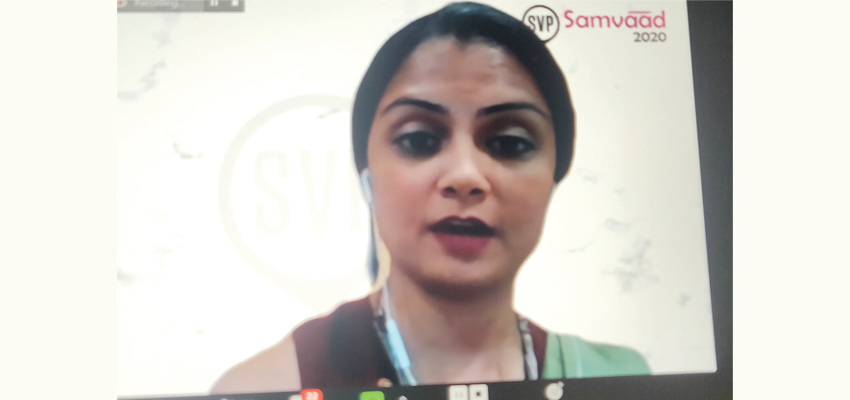The sustenance and creation of both jobs and wages is going to be difficult in the formal sector and hence we will need every effort possible in the non-formal and rural sectors by the government, corporate, social sector players and philanthropists to ensure that many millions of youth stay engaged in the pursuit of success in employment and entrepreneurship
Who says terminologies are only created in the corporate sector? For people involved in the social sector and trying to do good in today’s complex environment, two words hold great importance. One is “agency” which is the ability to inculcate a sense of aspiration and purpose in every community and every citizen’s life we choose to touch. And the other is the Sustainable Development Goals (SDG) articulated by the United Nations to make the world a more inclusive place.
At the commencement of the keynote sessions at the Inspiring Samvaad 2020 Conclave hosted by Social Venture Partners India in partnership with the Tata Trusts, we articulated six of the SDGs which drive our work and our model for change. Since the focus of much of what we do, in Pune and India is to prepare people for sustainable livelihoods, the first goal we pursue is naturally Number 4 of SDG which is Quality Education.
Education and Skills give people of the communities we serve an opportunity to rise above their squalid surroundings and dream of and build a better future for themselves, leading to Goal 8 of the SDG which is decent work and economic growth. Logically, an assiduous pursuit of these two goals all over the country would lead to the prime two goals comprising no poverty and zero hunger. Although that attainment may seem a long way away now in our Covid-19 ravaged country, we have to march towards it with our heads held high and hearts filled with hope.
Since hope by itself may be inadequate at a time when robust action is called for, it is important to focus on two other SDGs that can get us there faster than just ploughing a lonely furrow. The goal 17 in the SDG is partnerships and in face, the very first session addressed by Jamie of Aspen Institute, Washington DC, Naina of the Asian Venture Philanthropy Network, Singapore, Anita of Tata Trusts and Kunal Kumar Mission Director of the Smart Cities Mission of the Government of India chose to focus on how partnerships between civil society, corporates, individual philanthropists and even Government could make the difference in enabling scale, which is a crying need of our times.
Kunal specifically addressed Goal 11 of the SDG, which is building of sustainable cities and communities when he spoke passionately of the need to go beyond the hardware and software of smart cities and look at the economic and social impact needed to make citizens truly satisfied with physical, economic and technology infrastructure needed to make every citizen feel included in the benefits this fourteen-billion-dollar program can provide for the country.
India will have to limp back to growth and then will be lucky to see five per cent growth levels in the medium term
We are indeed entering a difficult period for the world and Indian economy and one of my favorite authors, Ruchir Sharma, in his conversations around his latest book has opined that India will have to limp back to growth and then will be lucky to see five per cent growth levels in the medium term. Notwithstanding Mr. KV Kamath’s positive pronouncements about the economy at the Maratha Chamber leadership transition event in Pune late September, the sustenance and creation of both jobs and wages are going to be difficult in the formal sector and we will need every effort possible in the non – formal and rural sectors by all participants – Government, corporate and social sector players and philanthropists to ensure that many millions of youth don’t lose and stay engaged in the pursuit of success in employment and entrepreneurship.
Some experiments in the city of Pune, initially by well-meaning corporates and in recent times, by the Pune Skills & Livelihood Lighthouses of Pune City Connect and some new programs targeted by missionary organizations like Global Talent Track and Social Venture Partners have shown that with the right inputs, jobs can still be created for the underprivileged and youth with physical or capability challenges.
At Samvaad 2020, the positive comments of social sector visionaries like Safeena Husain, CEO of Educate Girls on this outstanding institution’s scale work in Rajasthan, MP and UP and Zarina Screwvala on Swades’s work in Maharashtra give hope that models with demonstrated success in scope are available to scale country-wide. Jamie spoke of the Aspen Global Opportunity Youth Network, which has been doing community transformation in Pune and Jharkhand and also in Bogota and Mombasa and encourages initiatives that are designed by the youth for the youth. For the large-hearted, there are challenges as well as opportunities to jump in and contribute at this critical juncture for India and the world.
Let us commit ourselves to a mission. Many of us reading this column have adequate money and resources to satisfy our needs though as Gandhiji said, the world will never have enough to satisfy everybody’s greed. Let us for the next two years do our bit to alleviate the plight of sufferers around us, in our city, our state our country. Many of us who have joined Living my Promise have committed to give fifty per cent of our wealth to charitable causes. For each of you, the percentage may not be relevant but what certainly is an imperative is to throw our hats in the ring and help society to clamber out of the Covid-19 induced morass. As Swami Vivekananda said, “Arise, Awake and Stop not till the goal is reached.”
